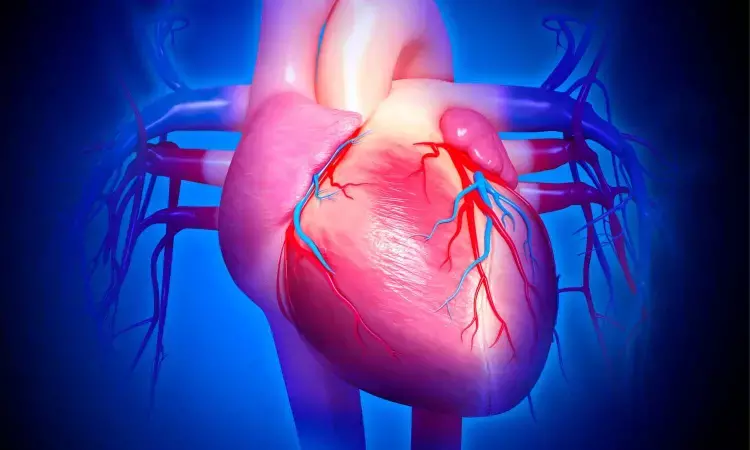- Home
- Medical news & Guidelines
- Anesthesiology
- Cardiology and CTVS
- Critical Care
- Dentistry
- Dermatology
- Diabetes and Endocrinology
- ENT
- Gastroenterology
- Medicine
- Nephrology
- Neurology
- Obstretics-Gynaecology
- Oncology
- Ophthalmology
- Orthopaedics
- Pediatrics-Neonatology
- Psychiatry
- Pulmonology
- Radiology
- Surgery
- Urology
- Laboratory Medicine
- Diet
- Nursing
- Paramedical
- Physiotherapy
- Health news
- Fact Check
- Bone Health Fact Check
- Brain Health Fact Check
- Cancer Related Fact Check
- Child Care Fact Check
- Dental and oral health fact check
- Diabetes and metabolic health fact check
- Diet and Nutrition Fact Check
- Eye and ENT Care Fact Check
- Fitness fact check
- Gut health fact check
- Heart health fact check
- Kidney health fact check
- Medical education fact check
- Men's health fact check
- Respiratory fact check
- Skin and hair care fact check
- Vaccine and Immunization fact check
- Women's health fact check
- AYUSH
- State News
- Andaman and Nicobar Islands
- Andhra Pradesh
- Arunachal Pradesh
- Assam
- Bihar
- Chandigarh
- Chattisgarh
- Dadra and Nagar Haveli
- Daman and Diu
- Delhi
- Goa
- Gujarat
- Haryana
- Himachal Pradesh
- Jammu & Kashmir
- Jharkhand
- Karnataka
- Kerala
- Ladakh
- Lakshadweep
- Madhya Pradesh
- Maharashtra
- Manipur
- Meghalaya
- Mizoram
- Nagaland
- Odisha
- Puducherry
- Punjab
- Rajasthan
- Sikkim
- Tamil Nadu
- Telangana
- Tripura
- Uttar Pradesh
- Uttrakhand
- West Bengal
- Medical Education
- Industry
Rapid onsite FFR-CT algorithm shows excellent performance for diagnosing hemodynamically significant stenosis

Switzerland: A high-speed onsite deep-learning based fractional flow reserve (FFR)-CT algorithm yielded excellent diagnostic performance for hemodynamically significant stenosis, with high interobserver and intraobserver reproducibility, according to an accepted manuscript published in ARRS’ own American Journal of Roentgenology (AJR).
“A rapid and accurate onsite approach for determining FFR-CT should address challenges encountered in the clinical adoption of prior FFR-CT implementations,” wrote corresponding author Ronny Ralf Buechel, MD, from University Hospital Zurich in Switzerland.
In this AJR accepted manuscript, 59 patients (46 men, 13 women; mean age 66.5 years) underwent coronary CTA (including calcium scoring) followed within 90 days by invasive angiography with invasive FFR and/or instantaneous wave-free ratio (iwFR) measurements from December 2014 to October 2021. Coronary artery lesions were considered to show hemodynamically significant stenosis in the presence of invasive FFR ≤0.80 and/or iwFR ≤0.89. A single cardiologist evaluated CTA images using an onsite deep-learning based semiautomated algorithm employing a 3D computational flow dynamics model to determine FFR-CT for coronary artery lesions detected by invasive angiography. Then, time for FFR-CT analysis was recorded. FFR-CT analysis was repeated by the same cardiologist in 26 randomly selected examinations and by a different cardiologist in 45 randomly selected examinations.
Ultimately, Buechel et al.’s onsite deep-learning-based FFR-CT algorithm evidenced AUC for hemodynamically significant stenosis based on invasive angiography—0.975, sensitivity of 93.5%, and specificity of 97.7%. Among severely calcified lesions, the same algorithm had an AUC of 0.991, a sensitivity of 94.7%, and a specificity of 95.0%. Moreover, the mean analysis time was 7 minutes and 54 seconds.
“To our knowledge,” the authors of this AJR-accepted manuscript added, “the currently reported mean processing timer represents the fastest reported time for onsite FFR-CT analysis.”
Reference:
High-Speed Onsite Deep-Learning Based FFR-CT Algorithm: Evaluation Using Invasive Angiography as Reference Standard, Andreas A. Giannopoulos, Lukas Keller, Daniel Sepulcri, Reto Boehm, Chrysoula Garefa, Prem Venugopal, Jhimli Mitra, Soumya Ghose, Paul Deak, Jed D. Pack, Cynthia L. Davis, Barbara E. Stähli, Julia Stehli, Aju P. Pazhenkottil, Philipp A. Kaufmann, and Ronny R. Buechel, American Journal of Roentgenology 0 0:0
Dr Kamal Kant Kohli-MBBS, DTCD- a chest specialist with more than 30 years of practice and a flair for writing clinical articles, Dr Kamal Kant Kohli joined Medical Dialogues as a Chief Editor of Medical News. Besides writing articles, as an editor, he proofreads and verifies all the medical content published on Medical Dialogues including those coming from journals, studies,medical conferences,guidelines etc. Email: drkohli@medicaldialogues.in. Contact no. 011-43720751


